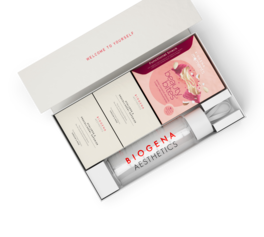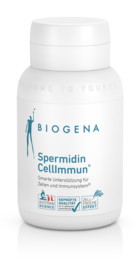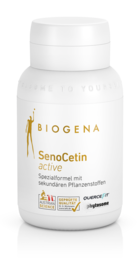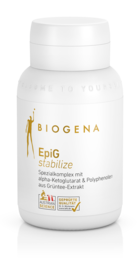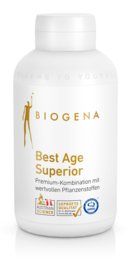Thanks to modern medicine, longevity and eternal youth are no longer just a matter of genetics or pure luck. They are art and science at the same time, which each of us can learn and implement in our daily lives in order to live in the best health possible for as long as possible. This development is synonymous with the term longevity and describes a world where the wisdom of age goes hand in hand with the vitality of youth. Here’s a holistic view of what it really means to live a long and healthy life and discover how small changes in daily life can help.
Definition: What is longevity?
Longevity means long life. It refers to the concept of a long, healthy and active life. While longevity is often simply understood to be a longer life compared to average life expectancy, longevity in a broader sense includes quality of life, health, vitality and well-being, which should also be maintained in later years of life. So it’s not just about maximising the number of years in your life, it’s about keeping your mental and physical fitness at a high level through to your old age.
Aging healthily: The 12 key aging processes
Aging is influenced by a complex network of biological changes – the 12 key processes of aging.
Telomere wear
As we age, the ends of chromosomes, called telomeres, become shorter and can no longer protect the DNA. This can increase the likelihood of genomic instability and impair cell function.
Genomic instability
The genome is the entirety of our genetic material and includes all genetic information in a cell. DNA is the spiral carrier of genetic information. DNA is damaged by mutations caused by environmental factors such as oxidative stress or even less efficient DNA repair mechanisms in old age. This also applies to our stem cells, which are responsible for general tissue renewal and regeneration. Damaged DNA can lead to a faulty cell function that impairs the proper function of tissues and organs.
Cellular senescence
Senescent cells are formerly healthy cells that can no longer divide due to their advanced age. They secrete substances that damage healthy surrounding cells. These cells, known as zombie cells, increase exponentially with age and lead to tissue and organ damage.
Dysbiosis
The microbiome is the entirety of all microorganisms – such as bacteria, viruses, etc. – in our body. Today, we know that we live in close symbiosis with our bacteria. They affect whether we are healthy or sick and have a correspondingly strong influence on our immune system. Dysbiosis becomes more common with age – a disorder of the normal microbial community. As a result, the risk of neurodegenerative diseases or cardiovascular diseases increases with increasing age.
Epigenetic changes
The epigenome is the molecular machinery that regulates the activity of our genes. So-called methylation deactivates and activates our genes. As we age, this regulatory process gets out of control. As a result, certain useful genes are turned off when they should be turned on, and genes that can cause problems are fatally turned on.
Chronic inflammation
Chronic inflammations that can be influenced by lifestyle factors occur more frequently as we age. These inflammations promote age-related diseases, including cardiovascular diseases, diabetes and neurodegenerative diseases.
Impaired intercellular communication
Cells interact, among other things, by transduction, the signal transmission to certain receptors where the signals are converted. Extracellular signals are thus converted into specific cellular reactions. However, with age, this communication is often more difficult and becomes more error-prone.
Mitochondrial dysfunction
Mitochondrial dysfunction plays an important role in age-related research. With increasing age, mitochondrial function disorders can occur, which can lead to inflammatory reactions. The mitochondria themselves are damaged by the inflammation, which can lead to a vicious cycle and contribute to a number of health problems.
Loss of proteostase function
Ideally, the proteins in a cell are always correctly folded and present in a suitable quantity. However, studies show that proteostasis changes with increasing age. The folding of proteins is often faulty with age. This is accompanied by a loss of proteostase function, which contributes to the development of many age-related diseases such as Alzheimer's disease, Parkinson's disease and cataracts.
Deregulated nutrient sensitivity
As we age, our cells are less exposed to nutrient signals, which affects a cell’s ability to use and produce energy. This can lead to reduced energy and metabolic disorders.
Stem cell exhaustion
With increasing age, stem cells lose their function or die. Because stem cells are responsible for producing new copies of our cells as needed, a lower number or dysfunctional stem cells lead to our tissues being less well regenerated and preserved.
Deregulated macroautophagia
Macroautophagia deregulation occurs when a body’s cells are unable to perform cellular self-cleansing. This leads to the accumulation of damaged or dysfunctional cell components and is associated with cancer, metabolic and neurological disorders.
Health tips for ageing: Get fit and healthy
The secret to a long and fulfilling life lies not only in extending our lifetime, but also in the quality of this additional time. People who are careful with their health create the ideal conditions for a fit life in old age.
Counteract aging
Many people would like to be able to turn back the hands of time with regard to their appearance. Although there’s no magic bullet when it comes to aging skin, this can certainly be positively influenced to a certain degree. Substances such as hyaluronic acid and collagen help to counteract early aging.
Promote autophagia and slow the natural aging process of the cells
Science has made significant progress in the pursuit of healthy aging with spermidine, a natural polyamine compound. Current studies show that spermidine counteracts age-related changes in the cells. It is closely linked to cell growth and function, keeping cells fresh and functional by promoting their self-cleaning process. However, with increasing age, the availability of spermidine in our cells decreases, leading to a decrease in cell vitality and increasing the risk of age-related diseases such as cardiovascular diseases and dementia. Age researchers believe that spermidine has the potential to slow the natural aging process of cells and to alleviate age-associated diseases.
Counteract cellular senescence and the signs of aging
Fisetin and quercetin show impressive anti-aging effects. Research suggests that Fisetin is an effective natural senolytic and supports quercetin in anti-aging. Senolytics initiate the degradation of senescent (old, damaged) cells, which would otherwise lead to a variety of signs of aging.
Healthy sleep to support autophagia
There are effective methods that support our body’s autophagia, with sufficient sleep being particularly promising. During sleep the glymphatic system, which transports the waste of the day, is activated in the brain. Sleep has long been neglected in medicine, but it is now known to be essential to our health. This is because the long-term lack of sleep can hinder the removal of cell waste and increase the risk of Alzheimer's. If you want to support your body, you can rely on spermidine.
Support your mitochondria and maintain cellular energy
Exercise is considered an effective method against aging by directly supporting the mitochondria, the cellular power plants. These are crucial for the energy supply in our body; for example, a heart muscle cell contains about 5,000 of these energy centres. Nerve, liver and sensory cells are also rich in mitochondria. However, it is problematic that the mitochondria can show signs of fatigue from the age of 25. Substances such as calcium, glycine, and alpha ketoglutarate can help maintain mitochondrial function and efficiency, optimising cellular energy production. For example, EpiG stabilize Gold by BIOGENA helps inhibit DNA methylation and promote DNA demethylation.
Biological aging refers to the process by which the human body loses functionality and structure over time. The natural aging process involves a number of biological mechanisms that cause the gradual decline in physical performance. These mechanisms include cell degradation, DNA damage, hormonal changes and tissue degradation. These changes lead to a reduction in the physiological capacity of the body, which increases the susceptibility to diseases and health problems.
Longevity research aims to deepen the understanding of these aging processes and develop strategies to improve quality of life with age and minimise the occurrence of age-related diseases.
The term “anti-aging” includes measures that aim at reducing or slowing down the aging processes and the negative accompanying symptoms of growing older (such as chronic diseases) through prevention, early diagnosis and therapies. This should not only extend your lifespan but also ensure that your later years are still full of vigour and energy.
Genes play an important role, but do not solely determine our life expectancy. Genetic factors are estimated to contribute approximately 25% to the lifespan of an individual. While some people have a higher genetic probability of getting older, research shows that lifestyle and environmental factors account for most of the variation in lifespan.
It is believed that lifestyles have a greater impact on health and lifespan than genetics in the first eight decades of life. Only in people over the age of 80 do genetics appear to play a more important role in keeping them healthy and viable. In the case of centenarians this is up to 33% in women and 48% in men. However, it must be taken into account that the development of individual differences in health and thus in longevity can be traced back to the dynamic interaction between genetic and environmental variations.
With advances in medicine, healthcare and an increasing awareness of healthy lifestyles, it is likely that the average life expectancy will continue to rise in the future. Innovations in the treatment of chronic diseases as well as the development of personalised medicine and better prevention strategies can contribute to prolonging life and improving quality of life in old age. However, the potential for longer lives also depends on socioeconomic factors, access to healthcare and global challenges such as pollution and climate change.
Further reading:
Brooks-Wilson, A. R. 2013. Genetics of healthy aging and longevity. Human genetics. 132:1323–1338.
Caruso, C. et al. 2022. How Important Are Genes to Achieve Longevity? Int J Mol Sci. 23(10):5635.
Chakravarti, D. et al. 2021. Telomeres: history, health, and hallmarks of aging. Cell. 184(2):306–322.
Sinclair, D. A., LaPlante, M. D. 2020. Das Ende des Alterns – Die revolutionäre Medizin von morgen. Dumont-Verlag.
Haas, R. H. 2019. Mitochondrial dysfunction in aging and diseases of aging. Biology. 8(2):48.
López-Otín, C. et al. 2023. Hallmarks of aging: An expanding universe. Cell. 186(2):243–278.
López-Otín, C. et al. 2016. Metabolic control of longevity. Cell. 166(4):802–821.
Mi, L., et al. 2022. The mechanism of stem cell aging. Stem Cell Rev Rep. 18(4):1281–1293.
Pagiatakis, C. et al. 2021. Epigenetics of aging and disease: a brief overview. Aging Clin Exp Res. 33:737–745.
Sameri, S. et al. 2020. Stem cell aging in lifespan and disease: a state-of-the-art review. Curr Stem Cell Res Ther. 15(4):362–378.
Saul, D., Kosinsky, R. L. 2021. Epigenetics of aging and aging-associated diseases. Int J Mol Sci. 22(1):401.
Voelpel, S., González y Fandiño, A. 2020. Die Jungbrunnen-Formel – Wie wir bis ins hohe Alter gesund bleiben. Rowohlt/Polaris-Verlag.




